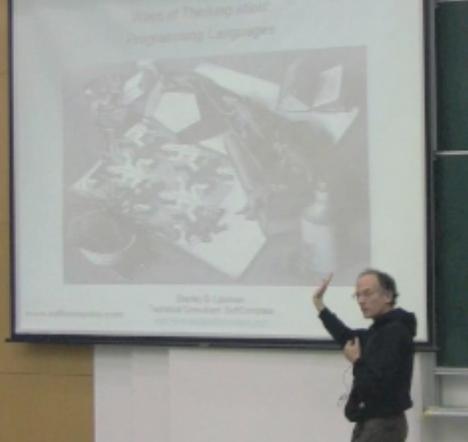Today we will talk about ways of thinking about programming languages that i hope you find it’s interesting. Since it is relatively informal, feel free to ask questions as we go if you like otherwise you can go and all ask the questions later.
The image here is how actually I’d like to think about programming. Here in the middle I think projected two imaginal is real statical in the programming. It’s the elemence that you think you understand the program and the code and you do that on your computer terminal and you write your code. It’s really separated from the runtime of the program. So you do the best of you can imagining how the application should work. but its all that in your code that it’s really not going to change once it actualy executed. It’s a very static way of doing execution.
Then you have to work dynamic aspects of the programming. Those little alligators coming all of the program really of the character of the runtime. They go and they use their little movements and they go back to program. And that is more going dynamic aspects of the programming, and more interesting, but also more difficult, because those things are moving around. So you see aspects of code you know runtime and the internet that dynamic and more interesting in a way, and you can interact with the plasticsmatical programing ability to generate code at runtime. but it’s much slower and more challenging to be able to come that way. .NET is trying to do that. Java has the semantic specs in fact.
In c++ we basicaly donging the part that is rejected. that’s the two imagional code. It’s staticaly runs very fast. so the static program doesn’t really look like that exciting is what the runtime machine runs really fast, and they fly the alligators and they think they’d like to get to. but its hard to know how to do that in the time frank. That let us get the result fast enough.
So a lot of more people is trying to do is geting the alligators walking around, and find out what it’s thinking trying to keep them fed and played. But a lot more actually hasn’t be done waiting for you actually run you program is not much you can do about it. So when you see in c++ program really there is nothing you can find out about program when it’s executed. You can find out the machine. You can always break through a c++ program and get access to the registers and memory. But you can’t really get access to the runtime. There is no way of doing that. We invented in c++, the ideas of runtime programming and meta programming and finding out about the code and generating code. That really was feasible. In the late of the last ten years or so, you know .NET and java is in a movement that try to have more dynamic language. But problem is that they runs very slow and nobody is quite sure how to do it.
So in the sense we have transition that you keep just entering into in terms of programing because what we really like to be able to do is to have programs bodyfy and change themselves as the behavoir of the program goes to look more like living things, if you will. And I think it’s where the programming has to move but we don’t quite have to do it fast enough time in order to get the results or something in cooking.
由于前面的几分钟没有PPT说明,听起来有点费劲,又是比较重要的开场白部分,就凑合着搞个字幕。。不过实在是听力有限单词量有限,尤其是灰色部分就是不知道了把发音乱标在那里。凑合可以看看就是了。
他后面就由此引起语言的发展历程了,最后加上对未来语言的猜测。
